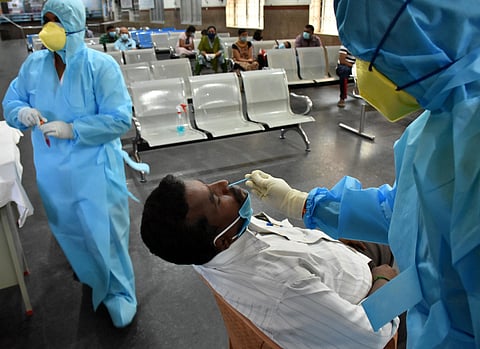

As were are stepping into Day 35 of the nationwide lockdown, people are both curious and paranoid about the ongoing course and are desperately looking for answers from experts.
Express pitches in with its initiative, in which, Dr P Kuganatham, Senior Epidemiologist and Member of the State Special Task Force against COVID-19 talks to Sushmitha Ramakrishnan and answers some of the most common questions that people of Tamil Nadu have in mind. Excerpts from the interview:
What is the reason behind the implementation of the four-day intensified lockdown and what evidence is it based on?
It is only to intensify the disease control mechanism in the community and ensure 100 per cent prevention of any infection spread from the ‘red zones’ to the ‘green zones’.
Is this a cause for the public to panic?
There is no need for panic. If you see in India, the virus has been infecting those in the middle-age group. Across the world, deaths are common only among those over 60 years. Younger population can be infected, but it may not lead to their death. They, however, pose a risk of infecting elders.
We hear enough about how to prevent COVID-19. But, how should one react and quarantine themselves at home if they suspect they have contracted it?
When the entire world is facing the pandemic and a large population is infected, (extensive) testing itself becomes a misnomer. WHO says that when testing is costly, it should only be done when people have high fever, breathlessness and cough. Influenza-like fever is another indicator. Moreover, people who are suffering from chronic ailments have to be very careful.
If they are sick, they should consider getting tested. Otherwise, only those who have come from abroad, or come in contact with them and health care workers should be tested.
So, should those with minor cough just go into self-quarantine and not get tested?
Most people may develop influenza-like symptoms five times a year. If someone is sneezing or having a cold or running nose without fever, cough or breathlessness, then they should simply drink warm water, take anti-histamines, isolate themselves and wear masks.
How to ensure social distancing in a small house with probably just one bedroom?
Social distancing matters a lot outside the house. Inside the house, if there are elderly people, they should stay isolated. People who go outside should not come in contact with elderly people. Even after the lockdown ends, elderly people should stay indoors for at least two months. Because the disease may peak only in the middle of May. And only then there will be a decline. In smaller houses, people should wear masks indoors if they have a cough or cold.
What is herd immunity? And what meaning would it assume in the context of COVID-19 in India?
People develop antibodies against infections. If antibodies are found in large parts of the population, then the community may be said to have developed an immunity. Asymptomatic people especially have antibodies and become the source of herd immunity. Mass vaccination usually results in herd immunity.
There is a question if herd immunity is possible in this novel coronavirus, as the virus changes its behaviour across countries and climatic conditions. The virus in India has infected a lot of people but does not seem as virulent to cause mortality, like in other countries.
There was a lot of confusion and panic around the burial of a health care worker in Chennai. What happens to the virus after an affected person dies?
People stigmatise and discriminate such cases as they lack clarity about the virus. In a dead body, the virus cannot live for long. For a few hours after death, the secretions from the mouth, nostrils or lungs, may carry the infection. Therefore, it is mandatory that the body is soon put in a bag filled with chlorine powder. This bag should be wrapped in another bag filled with chlorine powder.
Then it has to be sealed so that the liquid does not come out. The body has to be buried in 6-8 ft depth and covered with bleaching powder. Even in the electric crematorium, there is no need for touch.
Can the virus be transmitted from pets and other animals?
Many viruses are transmitted from animals to humans. When the virus jumps from animal to human, it mutates and changes its virulence and behaviour. In America, a tigers in a zoo are contracting the virus. But with respect to pets, we do not know at this point. It is safer to keep distance.
Will the lockdown be extended after May 3? If so, what steps should the public take after the lockdown is lifted?
I appreciate the public as they are highly disciplined and are staying indoors, except for about 10 per cent that won’t listen. But, once the lockdown is lifted, there is a danger of people flocking at the malls, resorts and other public places.
The public buses must restrict the number of passengers on board to 30.
Malls, theatres and centralised air-conditioned buildings can remain closed. IT employees can work from home, industries can run on more shifts with a fewer number of people on each shift.
Schools and colleges should continue online education. The staff at private hospitals must wear personal protective equipment.
Two-third of the people are daily-wagers. People should not die of starvation. Hunger is the worst disease. We have to modify the system to ensure there is no over-crowding after the lockdown is lifted.